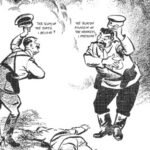Isabel Paterson’s Critique of Collectivism
The Historian and Senior Fellow at the Cato Institute, Jim Powell once dubbed Isabel Paterson, Rose Wilder Lane, and Ayn Rand the three “Founding Mothers” of American Libertarianism. In the sense that they have inspired many people to walk the libertarian path — myself included, for a time — this is true, but they did not set out to found something together in the sense that the Founding Fathers deliberately founded the United States. Rand, by far the most famous of the three, had her own philosophy, which she called, “Objectivism,” (pretentious, I know) and she hated being called a libertarian. Lane — daughter of Laura Ingalls Wilder, of the “Little House on the Prairie” series — comes in a distant second for recognizability, and Paterson tends to be, “You know, that third one? Can’t think of her name,” even among many libertarians. But they will forever be tied together in the history books for their somewhat similar thinking that many see as “ahead of its time.”
In 1943, Rand published her second largest, and second most popular book, “The Fountainhead,” while Lane put out, “The Discovery of Freedom,” and Paterson, “The God of the Machine.” Personally, I would recommend the last two far more than the first, but they were all a reaction against collectivism and expanding government; both of which were well on display in the midst of the Second World War. I’ll get around to Lane and Rand again, another day. For now, I want to focus on Paterson and the book I totally thought was a science fiction novel when I first heard the title.
Born in rural Canada in 1886, Isabel Paterson led a colorful life. Largely self-educated, she worked as a journalist and novelist before turning her attention to philosophy and economics. Her outspoken critiques of collectivism and government expansion gained her a dedicated following, while her sharp wit and independent spirit often ruffled feathers. In “The God of the Machine” she presents a robust argument for individual liberty and minimal government, drawing on historical examples and philosophical reasoning. Paterson begins by exploring the role of ideas in shaping history, suggesting that the power of ideas is the true driver of human progress. She contrasts the spirit of exploration and discovery, as exemplified by the Greek navigator Pytheas, with the commercial and political endeavors of the Phoenicians, who, despite their achievements, left no lasting legacy on Western civilization.
The title “The God of the Machine” refers to the guiding principles or natural laws that ensure the optimal operation of society and the economy, akin to a well-designed machine guided by an intelligent force. Paterson argues that when these principles are adhered to, the machine functions efficiently, promoting prosperity and freedom. However, when these principles are violated, through excessive government intervention or the erosion of individual liberties, the machine malfunctions, leading to stagnation and tyranny.
However, Paterson’s work is not without its weaknesses. Her treatment of slavery as a mere “fault in the structure” and her assertion that it was just one of the causes of the Civil War, underplay the depth of human depravity that was chattel slavery. Additionally, her critique of the post-Civil War Amendments, which she believes go against the original Constitution, fails to fully appreciate the moral and structural necessity of these amendments in rectifying the grave injustices of slavery and attempting to ensure equal rights for all citizens. In my experience, libertarians in general have a hard time with all these things, which is part of the reason why I fell out of alinement with them. Another reason is their selfish obsession with the prioritization of individual rights. Everything is a matter of, “my right to…” with little or no mention of any, “obligation to do” anything and certainly no acknowledgment that we are all in this together.
But just as you can go too far in the individualist direction, you can certainly gorge on the utopia of collectivism. And here is where Paterson makes her strongest arguments. It never ceases to amaze me what a sacred cow Karl Marx continues to be. Even those on the left who admit that Communism has been an utter failure from Day One, when the Bolsheviks took over Russia in 1917, still often put forth qualifications about how “real Marxism” has not been tried or properly understood and Marx’s insights about society are still valuable. Paterson lays this nonsense to waste, giving no deference to Marx and his ultimately murderous ideas. She compares Marxism to “The ancient classification of earth, air, fire, and water as ‘elements’” which was such an error that human knowledge could not advance until it was completely abandoned. But Paterson also sees Marx’s ideas as even more deceptive than the errors of the past, because they reduce verbal expression to literal nonsense, leading to endless and senseless debate. In her own words:
“Marxist terminology reduces verbal expression to literal nonsense on the basis of fact and usage; this is not obvious gibberish, nor the humorous nonsense which will sometimes elucidate an intrinsic difficulty of expression or indicate a gap in knowledge, but arrangements of words according to the rules of grammar, in which each word taken separately has a customary meaning, but which in the given sequence, the sentence, mean nothing at all. For example, let it be said that: “An isosceles triangle is green.” The several words are in common use, and as parts of speech they are placed in proper order; but the whole statement is absurd. That is bad enough, but it would be rather worse if one spoke of the “roundness of a triangle.” The phrase “dictatorship of the proletariat” is like the “roundness of a triangle,” a contradiction in terms. It has no meaning. The theory of “dialectical materialism” is a misuse of terms of the same type as the statement that an isosceles triangle is green. It posits an inevitable succession of a thesis producing its opposite or antithesis and the fissiparous abstraction reuniting into a synthesis. As nothing in nature does go through any such transmogrification, endless and senseless debate may be carried on by which social relations are said to exhibit in various phases a thesis, antithesis, and synthesis, each credited with “producing” its “opposite” and merging again into something else, like the Squidgicum Squee that swallers itself. Fools might argue solemnly that an isosceles triangle is not green but blue, or that a green isosceles triangle will produce a blue circle and the two will then synthesize into a purple cow or rhomboid; still these statements are empty. This is specifically the language of fools; for the deficiency which is indicated by the word fool is the incapacity to understand categories and the relation of things and qualities.
“Marx was a fool with a large vocabulary of long words.”
As I have often put it: The problem isn’t that real Marxism hasn’t been tried, the problem is that Marxism is not real. And I think it is Paterson, more than anyone, who first made me see this. For that, I am grateful.
Years ago, there was a book entitled, “It Usually Begins with Ayn Rand,” which argued that more people have become interested in libertarian-style thinking because of Rand’s writings than anyone else. I agree. But I’d also recommend you skip over her and check out Paterson, instead. Even if you are not curious about the evolution of the libertarian camp, it is important to engage with challenging ideas, especially those you might disagree with, from time to time. It is a means of fostering intellectual growth and understanding, which, sadly, seems like a rare pursuit in today’s world. Let’s strive to be the exception, actively seeking diverse perspectives and fueling our own intellectual journeys, rather than resting in comfortable echo chambers.













Leave a Reply